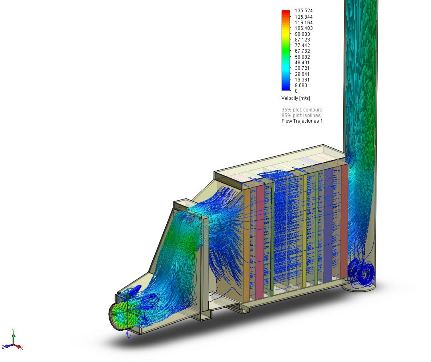
HRSG Inspection Planning Guide
Inspection is part of routine maintenance for any Heat Recovery Steam Generator (HRSG). Visual inspections are performed at regular intervals in accordance with the requirements of regulatory bodies and insurers.
Higher demands on outlet steam conditions has led to the increased use of modified low alloy materials (9-12% Cr), such as Grade 91. The superior high temperature material properties of these types of steels (strength, fatigue resistance, creep resistance, improved steam oxidation resistance) gives the designer advantages with respect to boiler reliability and thermal performance. There are many advantages of using this type of material; however, the long-term integrity has been an industry-wide concern ever since the first installations occurred. Tetra Engineering recently published an article in the Engineering Failure Analysis journal titled "Premature Grade 91 failures - worldwide plant operational experience" presenting our experience of premature Grade 91 failures from North America, Europe, the Middle East and Asia. If you are interested in a Grade 91 risk assessment, contact us.
Power Plant Simulator & Designer (PPS&D) provides state-of-the-art capabilities for modeling and simulating the operation of nearly any type of thermal power plant. Originally developed by KED GmbH in Germany for use by boiler OEMs in their detailed design work, PPS&D has since been used by numerous clients worldwide for simulating the operation of many types of boilers and thermal power plants.
Model Steady-State and Dynamic Boiler Operation
PPS&D is available in a basic version for performing steady-state simulations of plant operation. The enhanced version adds dynamic simulation, allowing testing and integration of key steam cycle control functions, and evaluation of system transient (startup, shutdown, process upset) response.

Tensile overload tube failures have become more common with the introduction of the larger combustion turbines that are typical of new combined cycle power plants. These failures are predominantly in reheater and superheater tubes, where inadequate drain capability exists during startup/shutdown or where desuperheater spray valves are not functioning appropriately. Desuperheater spray valve hardware and control logic have both contributed to these failures.
Effective inspection techniques for this damage mechanism depend on the severity and can include:
If you are interested in the full version of the HRSG Inspection Planning Guide (2nd edition) contact us.
Stay up to date and refer to our large collection of technical white papers and articles


Inspection is part of routine maintenance for any Heat Recovery Steam Generator (HRSG). Visual inspections are performed at regular intervals in accordance with the requirements of regulatory bodies and insurers.


Tetra Engineering provides a full-scope service for the modelling and operation analysis of all types of natural or forced circulation Power Boiler and HRSGs, including supercritical and once-through designs.


How a High Fidelity Thermal Plant Simulation Package Can Help Your Engineering Group Keep Your Plants at Peak Productivity?


Higher demands on outlet steam conditions has led to increased use of modified low alloy materials (9-12% Cr), such as Grade 91. The superior high temperature material properties of these types of steels (strength, fatigue resistance, creep resistance, improved steam oxidation resistance) gives the designer advantages with respect to boiler reliability and thermal performance. The advantages of using this type of materials are many; however, the long-term integrity has been a concern to the industry ever since the first installations.